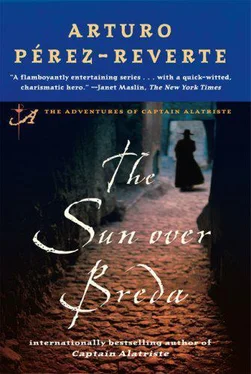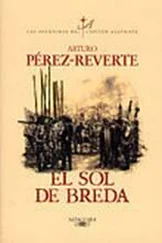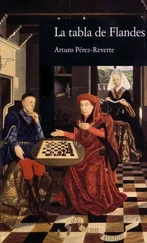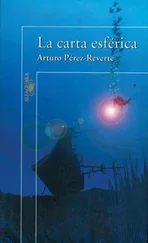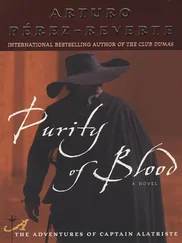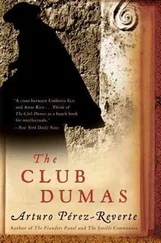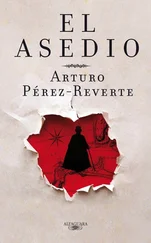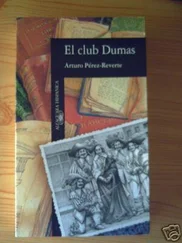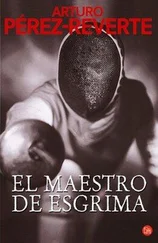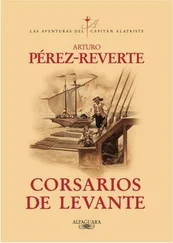Arturo Pérez-Reverte - The Sun Over Breda
Здесь есть возможность читать онлайн «Arturo Pérez-Reverte - The Sun Over Breda» весь текст электронной книги совершенно бесплатно (целиком полную версию без сокращений). В некоторых случаях можно слушать аудио, скачать через торрент в формате fb2 и присутствует краткое содержание. Жанр: Старинная литература, на английском языке. Описание произведения, (предисловие) а так же отзывы посетителей доступны на портале библиотеки ЛибКат.
- Название:The Sun Over Breda
- Автор:
- Жанр:
- Год:неизвестен
- ISBN:нет данных
- Рейтинг книги:5 / 5. Голосов: 1
-
Избранное:Добавить в избранное
- Отзывы:
-
Ваша оценка:
- 100
- 1
- 2
- 3
- 4
- 5
The Sun Over Breda: краткое содержание, описание и аннотация
Предлагаем к чтению аннотацию, описание, краткое содержание или предисловие (зависит от того, что написал сам автор книги «The Sun Over Breda»). Если вы не нашли необходимую информацию о книге — напишите в комментариях, мы постараемся отыскать её.
The Sun Over Breda — читать онлайн бесплатно полную книгу (весь текст) целиком
Ниже представлен текст книги, разбитый по страницам. Система сохранения места последней прочитанной страницы, позволяет с удобством читать онлайн бесплатно книгу «The Sun Over Breda», без необходимости каждый раз заново искать на чём Вы остановились. Поставьте закладку, и сможете в любой момент перейти на страницу, на которой закончили чтение.
Интервал:
Закладка:
One of the men carrying books out and piling them in the street was an elderly Dutchman with long white hair. He was wearing black, as pastors there did, with a dirty collar and gray hose. He did not, however, appear to be a religious man, if one may call those who preach the doctrines of that heretic Calvin religious—may lightning strike the whoreson in hell or wherever he may be stewing. In the end, I took him to be a secretary or city official trying to rescue books from the conflagration. I would have passed right by had I not noticed that the other individual, staggering through the smoke with his arms filled with books, wore the red band of the Spanish soldiers. He was a young man, bareheaded, and his face was covered with sweat and soot, as if he had already made many trips into the depths of the blazing inferno the building had become. A sword swung from his baldric, and he was wearing high boots blackened from charred wood and debris. He seemed to give little importance to the smoking sleeve of his doublet, not even when, finally noticing it as he set his load of books on the ground, he put it out with a couple of distracted swipes. At that moment he looked up and saw me. He had a thin, angular face and a trim chestnut-brown mustache that flowed into a short pear-shaped beard beneath his lower lip. I judged him to be between twenty and twenty-five years old.
“You could give me a hand,” he grunted, when he noticed the faded aspa , the red Saint Andrew’s cross, I wore sewn to my doublet, “instead of standing there gawking.”
He glanced toward the columns of the square, where a few women and children were taking in the scene, and wiped the sweat from his face with the singed sleeve.
“God help me,” he said, “but I am burning with thirst.”
He turned and, accompanied by the fellow in black, ran back to search for more books. After considering the situation for an instant, I raced to the nearest house, where a frightened Dutch family was watching with curiosity in front of a door that had been battered off its hinges.
“Drinken,” I said, holding out my two pewter jugs. I pantomimed drinking and then clapped one hand to the hilt of my dagger. The Dutch understood both word and gesture, for they filled the jugs with water, and I returned to where the two men were stacking books from another foray. When they saw the jugs, they dispatched the contents without taking a breath. Before plunging once more into the smoke, the Spaniard turned to me.
“Thank you,” he said very simply.
I followed him. I set my knapsacks on the ground and took off my velvet doublet, not because as he thanked me he had smiled nor because I was touched by his singed sleeve and his smoke-reddened eyes, but because suddenly that anonymous soldier had made me realize that at times there are more important things than collecting booty, even if the latter can sometimes be worth a hundred times one’s yearly pay. So I took as deep a breath as I could, and, covering my mouth and nose with a handkerchief I extracted from my pouch, I ducked my head to avoid the sputtering beams that were threatening to collapse and ran blindly into the smoke. I pulled books from the flaming shelves until the heat became asphyxiating and the embers floating in the air burned my throat with every breath. Most of the books were ashes by now, dust that was not “enamored,” as it was in that beautiful and distant sonnet by don Francisco de Quevedo, but only a sad residue, all the hours of study, all the love, all the intelligence, all the lives that could have illuminated other lives now vanished.
We made our last trip before the ceiling of the library collapsed in an explosion of flames that roared at our backs. Outside, we stood gasping for air, stupefied, clammy with sweat, our eyes tearing from the smoke. At our feet were around two hundred books and old documents. A tenth, I calculated, of what had burned inside the library. On his knees beside the pile, drained by his efforts, the Dutchman in black coughed and wept. When he had caught his breath, the soldier smiled at me as he had when I brought the water.
“What is your name, lad?”
I stood a little straighter, swallowing my last cough.
“Íñigo Balboa,” I said. “From the bandera of Captain don Carmelo Bragado.”
That was not strictly accurate. It was true that the bandera was indeed the one Diego Alatriste fought with and therefore mine, but in the tercios a mochilero was considered little more than a servant or bearer, not a soldier. But that did not seem to matter to the stranger.
“Thank you, Íñigo Balboa,” he said.
His smile widened, lighting up a face gleaming with sweat and black with smoke.
“Someday,” he added, “you will remember what you did today.”
A curious thing, by my faith. He had no way to divine it, but, as Your Mercies witness, it was true what that soldier said. I do remember very well. He put one hand on my shoulder and grasped one of my hands with the other. His was a strong, warm clasp. And then, without exchanging a word with the Dutchman stacking books in piles as if they were a precious treasure (and now I know that they were), he turned and walked away.
Several years would go by before I again encountered the anonymous soldier I had helped one foggy autumn day during the sacking of Oudkerk. In all that time I had never learned his name. It was only later, when I was a grown man, that I had the good fortune to meet him again, in Madrid and in circumstances that have nothing to do with the thread of the present tale. By then he was no longer an obscure soldier, and, despite the years that had passed since that morning long ago, he still remembered my name. And I at last would know his: He was Pedro Calderón, the famous playwright Pedro Calderón de la Barca, known throughout Spain.
But let us return to Oudkerk. After the soldier and I left the square, I went in search of Captain Alatriste, whom I found in good health, along with the rest of his squad. They were gathered around a small bonfire in the rear garden of a house that backed onto the dock of the canal, near the city wall. The captain and his comrades had been ordered to attack that section of the town, burn the ships at the docks, and secure the rear gate, thereby cutting off the retreat of enemy troops. When I caught up with the captain, the charred remains of burned ships were smoldering along the shore, and traces of the recent battle were visible on the dock, in the gardens, and in the houses.
“Íñigo,” said the captain.
His smile was weary and a little distant, and he had that look that remains imprinted on soldiers following a difficult battle, a look that the veterans of the tercios called “the last stand,” a look that during the time I had spent in Flanders I had learned to distinguish from other looks, such as that of weariness, resignation, fear, and absolute resolve. This was the look that stays in the eyes after other emotions have passed through them, the precise expression Captain Alatriste’s face wore at that moment. He was sitting on a bench, his elbow on the table by his side, his left leg extended as if it pained him. His knee-high boots were covered with mud, and he was wearing a dirty brown-sleeved doublet; it was unbuttoned, allowing me a glimpse of his usual buffcoat beneath it. His hat lay on the table beside a pistol—I could see it had been fired—and his belt with his sword and dagger.
“Come over to the fire.”
Gratefully, I obeyed as I took in the corpses of three Dutchmen lying close by: one on the planking of the nearby dock, another beneath the table. The third Dutchman was sprawled face down at the threshold of the back door of the house and held a halberd that had not served to save his life—or anything else for that matter. I observed that his pockets had been turned inside out, his corselet and shoes had been removed, and two fingers of one hand were missing, doubtless because whoever had taken his rings had been in a hurry. A brownish-red trail of blood led across the garden to the spot where the captain was sitting.
Читать дальшеИнтервал:
Закладка:
Похожие книги на «The Sun Over Breda»
Представляем Вашему вниманию похожие книги на «The Sun Over Breda» списком для выбора. Мы отобрали схожую по названию и смыслу литературу в надежде предоставить читателям больше вариантов отыскать новые, интересные, ещё непрочитанные произведения.
Обсуждение, отзывы о книге «The Sun Over Breda» и просто собственные мнения читателей. Оставьте ваши комментарии, напишите, что Вы думаете о произведении, его смысле или главных героях. Укажите что конкретно понравилось, а что нет, и почему Вы так считаете.
